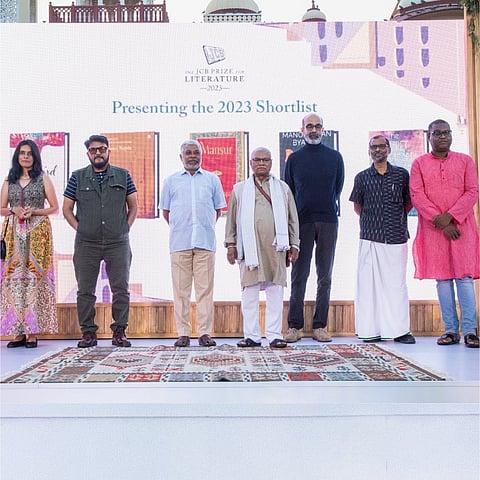

When the JCB Prize for Literature was launched in 2018, its Rs 25 lakh cash prize positioned it as India’s answer to the Booker Prize. For six years, it was a coveted accolade that celebrated Indian-language and literature in a publishing landscape, overwhelmingly dominated by English. However, without any warning, it stopped. There was no 2025 long-list announcement, no press release, just a quiet government filing that dissolved its non-profit status.
The literary world, partly, was left reeling. “It felt like a real loss,” says Tamil writer Salma, who fondly remembers it as one of the awards that supported.
Yet the silence surrounding its unprecedented demise points to deeper layered tensions. An open letter signed by more than 150 writers, including K Satchidanandan, Muhsin Parari, Meena Kandasamy, had earlier condemned the prize’s corporate sponsor, JCB, for its alleged complicity in what they called “bulldozer justice” against Muslim communities in India, as well as home demolitions in Palestine. “This prize cannot wash off the blood on JCB’s hands,” the letter declared.
Now, with the award gone, India’s literary community finds itself divided. Was the JCB Prize a vital platform for marginalised voices or merely a hypocritical public relations exercise? And what does its sudden collapse mean for the future of Indian literature?
The dilemma
For Perumal Murugan, the Tamil author who won the prize in 2023 (for his novel, Fire Bird, an English translation of his Tamil novel Aalanda Patchi), the award was transformative. “In India, writing in Indian languages hasn’t usually received the recognition it deserves,” he says. “This prize changed that. And it gave Rs 10 lakh to the translator, a substantial amount. Its discontinuation is really disappointing.”
The writer points out that five of the seven winners wrote in Indian languages such as Malayalam, Tamil, and Urdu, challenging the dominance of English. “If we say ‘regional literature,’ what’s the ‘main’ literature? All Indian languages should be treated equally,” he insists.
Writer and translator Gowri Ramnarayan highlights how the prize elevated the often invisible craft of translation. “Recognising translators was amazing. Usually, no one remembers who translated a book, only the author is remembered. The effort a translator puts in is tremendous. There’s neither fame nor money in it,” Gowri explains.
Corporate backing is a complex subject, but Murugan explains JCB’s involvement pragmatically. “Many companies exploit people. But JCB chose to invest in literature. They promoted winning books for a year, that visibily, was a big deal,” he says.
N Kalyan Raman, another translator — his most notable work Poonachi, which was shortlisted for the inaugural JCB Prize in 2018 — agrees. “It’s unrealistic to blame a bulldozer manufacturer for misuse by governments. Should we boycott all corporate-funded prizes? Some media sponsors are far more ethically compromised,” Kalyan argues.
He says, “Over the years, I’ve noticed that several of these literary prizes — Crossword, The Hindu, DSC Prize, to name a few — were suspended for a temporary period or permanently. So the shutdown of the JCB Prize wasn’t shocking.”
The case against
For many, the association with JCB could not be overlooked. The open letter quotes the findings of Amnesty International that has documented JCB equipment being used in at least 33 punitive demolitions of Muslim properties.
On the concerns of the ethics of literary funding, Nandini Krishnan, a translator, says, “The cash prize that one got — the sum total of which was probably what JCB earns in every minute and rewards for two years of your labour — what you do with it is your choice. Isn’t it?” She also questions the prize’s real impact. “Only hyped books got longlisted.”
Kalyan concurs on the prize’s limited reach. “Very few shortlisted works connected with readers. Their appeal remained narrow,” he admits. He further explains, “Out of 100 translations published yearly, just five or six made to JCB’s list. The rest have to deal with all the structural gaps in the mileu.”
The road ahead
Gowri believes the core problem lies in publicity. “The real gap is awareness. A Tamil book gets translated, but who hears of it? The media promotes only authors whose work appeals to what we arbitrarily believe to be relevant to the modern temper,” she observes.
Nandini proposes radical solutions for economic realities. “Book prices have barely doubled in 20 years, a rise of 100%, so the price is 200% what it used to be. You spend years writing or translating a book, and walk away with Rs 25 lakh or Rs 10 lakh if you win, I think, `1 lakh if you’re shortlisted. Compare that with the rise in book prices in the US and Europe. Does the economics make any sense?,” she asks.
Kalyan advocates for broader institutional support. We need second- and third-tier outlets which can provide space for various genres and translators that are not adequately accommodated by the mainstream publishers. We need more indie publishers for the same reason and space for quality discourse, like Ashoka’s, and libraries stocking translations,” he argues.
Salma remains hopeful despite the loss. “Writers in every Indian language are producing excellent work. We need prizes that recognise them, without compromise,” she says.
The JCB Prize leaves behind a broken legacy. For some, it was a bridge spanning India’s many languages. For others, a fragile crossing built on a marshland. Its absence creates a silence, and asks a deep question: Can the world of Indian literature bloom without corporate roots, or must it find a fairer path to grow? “There’s too much noise,” Gowri reflects. “The challenge is: how do we bring literature into people’s lives?”
While the discussion continues, the stories of recognition and invisibility remain. Despite the flaws in the system, may writers and translators succeed in reaching their audience and receiving their rightful recognition.